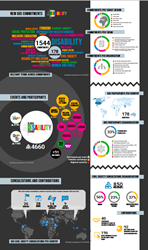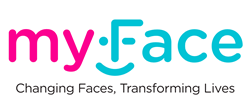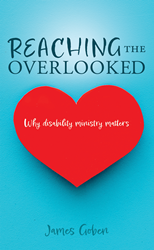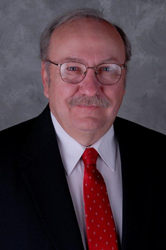
Bringing together governments, businesses, civil society, the Global Disability Summit is a pivotal moment for the world to commit to change and do more to include people with disabilities.
“The Global Disability Summit is an opportunity for all of us to make progress towards a world where everyone is included and can access their human rights,” said Vladimir Cuk, Executive Director of the International Disability Alliance.
GENEVA (PRWEB)
February 15, 2022
Bringing together governments, businesses, development professionals, and Organisations for People with Disabilities (OPDs), the Global Disability Summit is a pivotal moment for the world to commit to change and do more to include people with disabilities.
This is the second-ever global summit on strengthening the inclusion of people with disabilities and it will build on the progress made in the wake of the first Global Disability Summit in London in 2018. Throughout the summit more than 1,544 new commitments to disability rights will be announced by organisations and governments in more than 150 countries.
The number of people with disabilities is estimated to be around 15% of the world’s population, around one billion people, and 80% live in low- and middle-income countries. Despite this, millions of people with disabilities still face stigma, discrimination, and barriers to full-participation in society. People with disabilities have also disproportionately been affected by the COVID-19 pandemic.
In his welcome video to the summit, the Prime Minister of Norway, Jonas Gahr Støre, said, “I am pleased to be co-hosting the Global Disability Summit together with the President of Ghana and the International Disability Alliance. With less than eight years to go before the world is to reach the Sustainable Development Goals, we must ensure that people with disabilities are able to take part in social and economic development on an equal footing with society at large”.
President of Ghana, Nana Addo Dankwa Akufo-Addo, has said, “Governments have a solemn obligation to commit to building an inclusive society in which every citizen has the opportunity to develop his or her God-given talent to the fullest. The circumstances of one’s birth cannot and must not be a barrier to any citizen’s participation in – and their benefit from – the process of national development”.
Along with the Prime Ministers of Ghana and Norway, representatives from more than 15 governments will be speaking at the summit and making commitments. International organisations that will be represented include the World Health Organization, the United Nations, UNICEF, USAID, UNHCR, the Global Partnership for Education, the International Committee of the Red Cross, Save the Children, the Valuable 500, and the International Labour Organization.
Key facts:
- Over 1,544 commitments to disability rights will be made for GDS 2022.
- This exceeds the 968 commitments made in 2018.
- More than 178 organisations from 151 countries will make commitments.
- Over 300 commitments from governments will be made.
- Commitments will come from all regions of the world: Global (36%), Africa (45%), Asia-Pacific (7%), Europe (6%), Latin America and the Caribbean (3%), Middle East (2%), North America (0.5%).
- More than 2,200 people have registered for the youth Summit and over 4,400 people will virtually attend the main summit.
- Alongside the main summit there are 4 thematic workshops, 4 regional summits, 2 thematic round tables and 91 side events.
Vladimir Cuk, Executive Director of the International Disability Alliance, said, “The global COVID-19 pandemic has not only shown us that we are all connected, but has also highlighted the devastating inequalities faced by people with disabilities. We must do more to include the world’s 1.2 billion people with disabilities, who cannot and will not be ignored. The Global Disability Summit is an opportunity for all of us to make progress towards a world where everyone is included and can access their human rights”.
The second Global Disability Summit will be held on 16-17 February 2022. This year’s summit will be entirely virtual and is being live-streamed from Norway.
Organisations of Persons with Disabilities have played an important role in the design, implementation, and follow-up of the summit.
More information along with the up-to-date agenda can be found online, and anyone can take part in the summit at: http://www.globaldisabilitysummit.org
For updates and live announcements follow us on Twitter at: @GDS_Disability, #CommitToChange and #GDS2022
-END-
About the Global Disability Summit
The Global Disability Summit Secretariat was established to monitor the implementation of the commitments made at the first Global Disability Summit and the commitments that will be made in the future. It works to provide substantive inputs and coordination of the organization of the Global Disability Summits.
In July 2018, the UK Department for International Development, alongside the Government of Kenya and the International Disability Alliance, organised the first ever Global Disability Summit in London. The summit in London succeeded in placing the issue of rights-based, disability-inclusive development on the international agenda.
The Oslo Summit in 2022 will seek new commitments and concrete action to accelerate inclusive development, through access, engagement and equality. The Summit will mobilise efforts to further the implementation of the Convention on the Rights of Persons with Disabilities (CRPD) in line with the principle of leaving no one behind, and to build back better and more inclusively in the post-Covid-19 recovery.
The Secretariat has established an accountability mechanism to follow the implementation of commitments, supporting stakeholders to achieve the promises they made.
The themes for the 2022 summit are:
1. Capacity-strengthening of organisations of persons with disabilities in the Global South
2. Inclusive Education
3. Inclusive Health
4. Inclusive Employment and Livelihoods
5. Inclusion in situations of crises and conflict, including a focus on climate change
- Gender is a cross-cutting theme.
Consultations
In 2020-2021, IDA, its members, and partners were able to organize 27 national and 1 regional consultations with organizations of persons with disabilities (OPDs) in 26 countries, 23 different spoken and sign languages, for a total of 840 people attending. Of the participants, 56% were women, 23% were indigenous peoples and 38% were from underrepresented groups of persons with disabilities.
Share article on social media or email:













